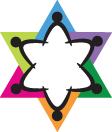One of the most powerful statements about the importance of Jewish Peoplehood comes to us every year through the story of the Wicked Son in the Passover Hagaddah.
What does the Wicked Son (‘Ha’Rasha’) say?
“What is this [Passover] to you?”
To you, and not to him. And since he excludes himself from the community and rejects a major principle of faith (kofer b’ikar), you should set his or her teeth on edge and say
“It is because of this that God did for me when I went free from Egypt” (Exodus 13:8)
The Haggadah judges this child very harshly, it even calls him ‘wicked’ or ‘evil’. It understands that the essence of his question are the words “to YOU”, and thus this child divorces himself from the community of the Jewish People. He doesn’t think that Passover has anything to do with him, he doesn’t realize or understand (yet?) that what happened to the rest of the Jewish People in Egypt includes him and that he is part of it.
Many today are confused about the role of Peoplehood In Jewish identity; some believe that keeping Jewish law and the mitzvot (the commandments) on an individual level will make their Judaism whole. And yet Judaism was never just a religion for individuals. It was also always a People, connected through a joint past (the Exodus is a special example) and an ethos regarding the contribution of that People to the world. It was this ethos that inspired Jews to build a rich and comprehensive civilization over centuries and through dispersions, and even to build a State in the 20th century.
And so the Hagaddah emphasizes that a key part of understanding Passover is internalizing the fact that through the Exodus the Jewish People was formed, and that all of us have a part to play in the ongoing story of that People. The Wicked Son is the voice of those who have missed part of what makes Jews who they are.
When you get to the story of the Wicked Son in your Passover seder, ask your family and friends the following questions:
- The very term “rasha” is difficult to translate: “wicked” or “evil” are very harsh, uncompromising words. “Rebellious”, “mischievous”, “recalcitrant”, “chutzpadik”, “impolite”, “naughty”, “difficult”, “problematic” and “alienated” are also possible, given the context. Do you think that the “rasha’s” question is worthy of such a strong judgement? Are there other words that you think better describe this child?
- The Exodus story is the liberation story of the Jewish People as a people. Think about the different happenings in the story (the plagues, the Passover sacrifice etc.,). Discuss how you think these events contributed to the formation of the People as a collective, and not just a group of families or tribes.
- The Haggadah tells us that each one of us has to see him or herself as a part of the Jewish collective experiencing the Passover story. When and in what situations do you feel part of the Jewish People? And when do you not?
This year at our Seders lets explore the essence of being a People, as we write the next chapter in the Jewish journey together.
Chag Sameach! Happy Passover!





